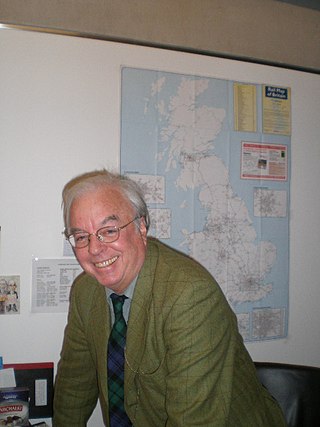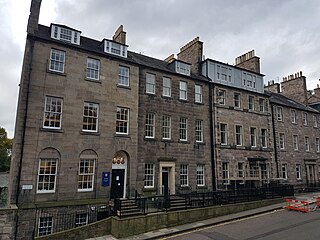Related Research Articles

Alexander Runciman was a Scottish painter of historical and mythological subjects. He was the elder brother of John Runciman, also a painter.

(James) Hamish Scott Henderson was a Scottish poet, songwriter, communist, intellectual and soldier. He was a catalyst for the folk revival in Scotland. He was also an accomplished folk song collector and discovered such notable performers as Jeannie Robertson, Flora MacNeil and Calum Johnston. Born in Blairgowrie, Perthshire on the first Armistice Day 11 November 1919, to a single mother, Janet Henderson, a Queen's Nurse who had served in France, and was then working in the war hospital at Blair Castle. His name was recorded at registration as James but he preferred the Scots form Hamish.

Neil Miller Gunn was a prolific Scottish novelist, critic, and dramatist who emerged as one of the leading lights of the Scottish Renaissance of the 1920s and 1930s. With over twenty novels to his credit, Gunn was arguably the most influential Scottish fiction writer of the first half of the 20th century.
Maurice Lindsay CBE was a Scottish broadcaster, writer and poet. He was born in Glasgow. He was educated at The Glasgow Academy where he was a pupil from 1928-36. In later life, he served as an honorary governor of the school.
George Campbell Hay (1915–1984) was a Scottish Symbolist poet and translator, who wrote in Scottish Gaelic, Scots and English. He used the patronymic Deòrsa Mac Iain Dheòrsa. He also wrote poetry in French, Italian and Norwegian, and translated poetry from many languages into Gaelic.
The Scottish Renaissance was a mainly literary movement of the early to mid-20th century that can be seen as the Scottish version of modernism. It is sometimes referred to as the Scottish literary renaissance, although its influence went beyond literature into music, visual arts, and politics. The writers and artists of the Scottish Renaissance displayed a profound interest in both modern philosophy and technology, as well as incorporating folk influences, and a strong concern for the fate of Scotland's declining languages.
Stephen Maxwell was a Scottish nationalist politician and intellectual and, from the 1980s, a leading figure in the Scottish voluntary sector.

The Kailyard school is a proposed literary movement of Scottish fiction; kailyard works were published and were most popular roughly from 1880–1914. The term originated from literary critics who mostly disparaged the works said to be within the school; it was not a term of self-identification used by authors alleged to be within it. According to these critics, kailyard literature depicted an idealised version of rural Scottish life, and was typically unchallenging and sentimental.
Allan Johnstone Massie is a Scottish journalist, columnist, sports writer and novelist. He is a Fellow of the Royal Society of Literature. He has lived in the Scottish Borders for the last 25 years, and now lives in Selkirk.

Kenneth White was a Scottish poet, academic and writer.

William Alexander Murray Grigor is a Scottish film-maker, writer, artist, exhibition curator and amateur architect who has served as director of the Edinburgh International Film Festival. He has made over 50 films with a focus on arts and architecture.

Cencrastus was a magazine devoted to Scottish and international literature, arts and affairs, founded after the Referendum of 1979 by students, mainly of Scottish literature at Edinburgh University, and with support from Cairns Craig, then a lecturer in the English Department, with the express intention of perpetuating the devolution debate. It was published three times a year. Its founders were Christine Bold, John Burns, Bill Findlay, Sheila G. Hearn, Glen Murray and Raymond J. Ross. Editors included Glen Murray (1981–1982), Sheila G. Hearn (1982–1984), Geoff Parker (1984–1986) and Cairns Craig (1987). Raymond Ross was publisher and editor of the magazine for nearly 20 years (1987–2006). Latterly the magazine was published with the help of a grant from the Scottish Arts Council. It ceased publication in 2006.

Professor Christopher Harvie is a Scottish historian and a Scottish National Party (SNP) politician. He was a Member of the Scottish Parliament (MSP) for Mid Scotland and Fife from 2007 to 2011. Before his election, he was Professor of British and Irish Studies at the University of Tübingen, Germany.
Scotland has produced many films, directors and actors.
Tom Hubbard was the first librarian of the Scottish Poetry Library and is the author, editor or co-editor of over thirty academic and literary works.
Brian Holton is the translator of Chinese "Misty" poet Yang Lian. He translates into English and Scots, and is the only currently-publishing Chinese-Scots translator in the world.

The School of Scottish Studies was founded in 1951 at the University of Edinburgh. It holds an archive of approximately 33,000 field recordings of traditional music, song and other lore, housed in George Square, Edinburgh. The collection was begun by Calum Maclean - brother of the poet, Sorley MacLean - and the poet, writer and folklorist, Hamish Henderson, both of whom collaborated with American folklorist Alan Lomax, who is credited as being a catalyst and inspiration for the work of the school.
John Duncan Macmillan is a Scottish art historian, art critic, and writer.
Robert Cairns Craig is a Scottish literary scholar, specialising in Scottish and modernist literature. He has been Glucksman Professor of Irish and Scottish Studies at the University of Aberdeen since 2005. Before that, he taught at the University of Edinburgh, serving as head of the English literature department from 1997 to 2003. He was elected a fellow of the British Academy in 2005.
Bill Findlay was a Scottish writer and theatre academic. As a translator, editor, critic and advocate, he made an important contribution to Scottish theatre. He worked as a lecturer in the School of Drama at Edinburgh's Queen Margaret University and was a founder editor and regular contributor to the Scottish and international literature, arts and affairs magazine, Cencrastus.
References
- ↑ Devine, Thomas Martin; Logue, Paddy (18 November 2002). Being Scottish: Personal Reflections on Scottish Identity Today. Polygon. ISBN 9781902930367 – via Google Books.
- 1 2 3 4 Smith, Graham R., "Billy Kay", in Parker, Geoff (ed.), Cencrastus No. 20, Spring 1985, pp. 2 - 7, ISSN 0264-0856
- ↑ Hearn, Jonathan (18 November 2000). Claiming Scotland: National Identity and Liberal Culture. Polygon at Edinburgh. ISBN 9781902930169 – via Google Books.
- ↑ Hannan, Martin (20 November 2021). "Scots author Billy Kay releases Scots: The Mither Tongue as audiobook". The National. Archived from the original on 20 November 2021. Retrieved 20 November 2021.
- ↑ Kay, B. (1980), Odyssey: Voices from Recent Scotland’s Past, Polygon Books, Edinburgh, ISBN 9780904919479
- ↑ Lockerbie, Catherine, "Making Waves: Radio in Scotland", in Parker, Geoff (ed.), Cencrastus 20, Spring 1985, pp. 8 - 11, ISSN 0264-0856
- ↑ Edinburgh International Festival Programme, The Saltire Society, August 1985
- ↑ Alexander, Michael (30 October 2019). "Newport's Billy Kay 'honoured' to receive prestigious Scottish-American cultural award in New York". The Courier. DC Thomson Media. Retrieved 28 October 2020.
- ↑ Ferguson, Brian (29 September 2019). "Winners of first ever Scots language 'Oscars' revealed". The Scotsman. JPI Media. Retrieved 27 October 2020.